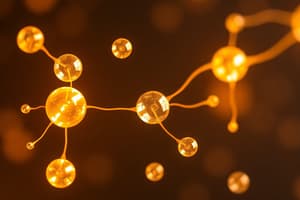Podcast
Questions and Answers
Match the following terms with their descriptions:
Match the following terms with their descriptions:
Octet rule = Refers to the tendency of atoms to prefer to have eight electrons in the valence shell Cations = Positively charged ions, often formed by metals when making ionic compounds Anions = Negatively charged ions, often formed by nonmetals when making ionic compounds Valence shell = The outermost shell of an atom, where valence electrons are located
Match the following statements with the correct outcomes of electron gain or loss:
Match the following statements with the correct outcomes of electron gain or loss:
Atoms with fewer than eight electrons in the valence shell = Tend to react and form more stable compounds by losing or gaining electrons Atoms that lose electrons = Acquire a positive charge and become cations Atoms that gain electrons = Acquire a negative charge and become anions Atoms with nearly eight electrons in the valence shell = Can gain additional valence electrons to achieve an octet
Match the following terms with their characteristics:
Match the following terms with their characteristics:
Valence electrons = Electrons located in the outermost shell of an atom Ions = Charged particles formed by the loss or gain of electrons Metals = Tend to become cations when making ionic compounds Nonmetals = Tend to become anions when making ionic compounds
Match the following phenomena with their explanations:
Match the following phenomena with their explanations:
Match the following outcomes with their consequences:
Match the following outcomes with their consequences:
Flashcards are hidden until you start studying





